| Black Elders of Portsmouth |
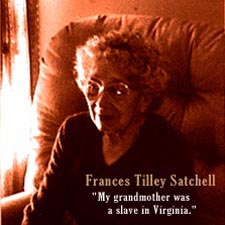
NH BLACK HISTORY
Beginning in 1990 historian Valerie Cunningham interviewed over a dozen elderly members of the African American community in Portsmouth, New Hampshire. Selections from five of those interviews are included here, All five of those interviewed have since died, but their memories of growing up black live on.
Seacoast Black History
ORAL HISTORY HIGHLIGHTS
This project was inspired by a fear of losing another generation's accounts of life in the region as experienced by African-Americans. The intention was not to write definitive autobiographies but simply to capture some of the memories and images of people who had lived in the region since before WWII. What emerged was a collection of stories reflecting their very different personal experiences and points of view. Interviews were completed between September 1990 and December 1991. Five of the fourteen interviews are represented here. The photographs are all by Kelvin Edwards. -- Valerie Cunningham, African American Resource Center (PO Box 5094, Portsmouth, NH 03801)
Click on each elder to read an interview
CONTINUE to read elder interviews
HAZEL SINCLAIR ( 1902 -- 1995 )
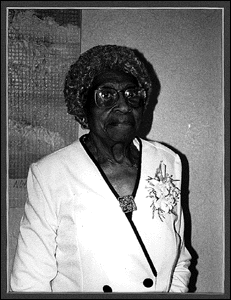 I liked dramatics and that sort of thing. In New York, I took lessons from Richard B. Harris, who played the Lord in "Green Pastures." He was going to get me a part in the play, but my father got sick and I returned to Baltimore. My father always said, "decent people don't go on the stage." I've been satisfied that I didn't get the part because I don't think I would have lived this long a life by doing that--you know, living would have been very different.
I liked dramatics and that sort of thing. In New York, I took lessons from Richard B. Harris, who played the Lord in "Green Pastures." He was going to get me a part in the play, but my father got sick and I returned to Baltimore. My father always said, "decent people don't go on the stage." I've been satisfied that I didn't get the part because I don't think I would have lived this long a life by doing that--you know, living would have been very different.
I came here as a lady's maid. [She] lived at the Plaza Hotel in New York in the winter and she had a summer home here. Of course, she had a cook and a housekeeper and a chauffeur, too. I would take care of her clothes, see that they are mended, pressed, and ready to wear. I had to take care of her bedroom and I served her meals. It was just one woman.
I met Clayton in the summer of 1936. He came with another family here in Kittery Point. We...married...and we came back here as a couple in the summer of 1937. She didn't have a cook that year, and I knew nothing about cooking. She taught me. I used to mess up a few things but it was all right--she liked me. She had cookbooks and she would explain how she liked things and so on, and I finally got to be a cook.
I got a job on the Navy Yard. They were taking women on during the war [W.W.II] and several of us black women went to the Yard to work. I got in the woodworking shop. I was a woodworker's helper. They didn't let women work on the machines. You just stood there and a man was behind the machine and you were in front of it, and as the lumber came through you would take it and put it on a little cart, pile it up on the cart. I was there two years and four months.
We had started taking guests at our house, in the garage...called it "Rock Rest." I served them breakfastand dinner. It went by word-of-mouth. After so many people were wanting to come, we extended the garage, put in two more bedrooms and another bathroom. We could take care of up to sixteen people. Quite often a group would call from Boston and want to come and just have dinner on Sunday. I'd cook and work all summer and Clayton was working at the navy yard. Then we'd take our vacation in the fall. We went to Mexico, Canada, the Caribbean... I have no regrets.
(c) Valerie Cunningham
CONTINUE to read elder interviews
FRANCES TILLEY SATCHELL ( 1910 -- 1992 )
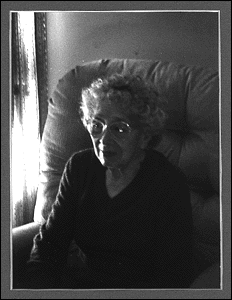 My grandmother was a slave in Virginia. She came up here as a baby sitter...for a white family. She lived to be 101. My father was in his own moving business. He moved with horses not a truck. We didn't have trucks in his days. He'd go from here to Newburyport and different places, even to Boston. He used to take his team, get up 2 and 3 o'clock in the morning and get my brothers up and they'd go off on a moving spree. He would move anything. He also worked on the navy yard, moving stuff for the government. He had four horses. They were a team of horses. We had the stables right in back of the house. I used to comb their tails and braid them. My father would shine--his harnesses would shine like new money! We had the most beautiful horses in town! They were in parades and everything. Those horses would eat if he didn't have a job and nothing came in. He'd say to my mother, "I'm sorry, Kate, but the horses have got to eat." So she'd have to go out doing housework and make it for us while he made it for the horses.
My grandmother was a slave in Virginia. She came up here as a baby sitter...for a white family. She lived to be 101. My father was in his own moving business. He moved with horses not a truck. We didn't have trucks in his days. He'd go from here to Newburyport and different places, even to Boston. He used to take his team, get up 2 and 3 o'clock in the morning and get my brothers up and they'd go off on a moving spree. He would move anything. He also worked on the navy yard, moving stuff for the government. He had four horses. They were a team of horses. We had the stables right in back of the house. I used to comb their tails and braid them. My father would shine--his harnesses would shine like new money! We had the most beautiful horses in town! They were in parades and everything. Those horses would eat if he didn't have a job and nothing came in. He'd say to my mother, "I'm sorry, Kate, but the horses have got to eat." So she'd have to go out doing housework and make it for us while he made it for the horses.
First, I went to the old Franklin School on Maplewood Avenue, that little brick building out there. There were two rooms. I went in the fifth grade up in the New Franklin School. Whipple School, I went to junior high there. Then, I went to the old high school on Islington. I quit my last year. My sister died and left children, one, two and three years old. My mother kept me out of school a few months to take care of them, and then...you don't want to go back. It's hard to make up. I often thought of doing it. But we stayed out to help take care of those children.
I still sing in the choir [at the black church] When I was young, I sang and I recited. They'd give me the longest piece to learn. One day I recited the Emancipation Proclamation from memory. And a lot of poems I know now I learned when I was eight and nine years old. I can say them all by heart now. I used to learn a lot of them. I'd sit down and read them over and get up and say it.
My mother would say you don't go by what somebody tells you, you go by what you know and what you see--and that's the way we were brought up.
(c) Valerie Cunningham
CONTINUE to read elder interviews
DORIS MOORE ( 1919 -- 1993 )
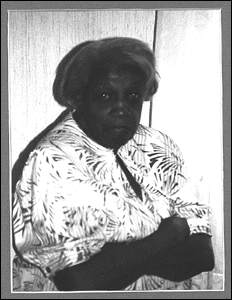 At the end of the school day, I'd come home and I'd do my homework, then my two things would be reading and the radio. I was a loner, shy. I had girlfriends at school but at home I didn't. All my friends were white. I'd see them at school but after school they'd go their way and I'd go my way. I can't remember ever having a black girlfriend. The Glee Club always sang at graduation, so I decided I was going to do that. I got in the Glee Club and sang at baccalaureate. There wasn't any interracial dating back then, that I know of. My brother taught me to dance for graduation, so he could take me to the prom.
At the end of the school day, I'd come home and I'd do my homework, then my two things would be reading and the radio. I was a loner, shy. I had girlfriends at school but at home I didn't. All my friends were white. I'd see them at school but after school they'd go their way and I'd go my way. I can't remember ever having a black girlfriend. The Glee Club always sang at graduation, so I decided I was going to do that. I got in the Glee Club and sang at baccalaureate. There wasn't any interracial dating back then, that I know of. My brother taught me to dance for graduation, so he could take me to the prom.
I was in the first WAC unit to go overseas. We were the 688th Central Postal Battalion. All black women. We went over on a French passenger ship. It was huge. They also had the soldiers and the Red Cross nurses on there. We landed in Glasgow, Scotland and came on down to Birmingham, England. When we got there, all the English chicks had the black men! Later, I had a boyfriend. I guess it was who comes first. It was no problem. About two years later, we went across the English Channel and were stationed in France. We had a ball! I had a chance to go to Switzerland and we went to Paris and the Left Bank. I was in Paris on D-Day.
I went to Atlanta and I worked at the Toccoa County Child Welfare Board...while I was working on my master's. After I got my MSW, I worked for Family Services in Louisville, Kentucky. I was the only black in the agency. I noticed I didn't have any white clients, only black clients. I sashayed down to the office and I says, "I'm coming here to do social work. You're not going to say when a black client comes in, this is for you. I'm just taking all clients." So it was the first agency that had a mixed case load, white and black clients.
Mother was sick and my sister had her own family to take care of so I came back to take care of her. I joined the staff of the Children's Aid Society in Manchester, New Hampshire in March 1 959...served as a social worker with a major responsibility for providing intake services to new clients for the Central and Manchester regional offices. I had a nice apartment right downtown Manchester, near the agency. I drove to my house in Portsmouth on weekends and then back to Manchester for the week. On January 16, 1981, I retired with twenty-two years.
(c) Valerie Cunningham
CONTINUE to read elder interviews
HENRY PETTIFORD (1917 -- 1994)
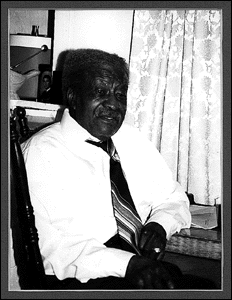 Well, I got to Portsmouth and I says, "Wait a minute! This is out of the world for me." I'm telling you I'd never seen such a lonesome place. There weren't many of us to go around with when I got to Portsmouth. I was with the white boys. I didn't have anyone else to go around with. Then when I met Clarence I started going out with him. That's how we got together. We used to play ball at Prescott Park until we got old enough to go to the beer joint. We used to go to [the black] church but they were passing them bibles too much! Well, where were you going, anyway? There was nowhere to go. I mean, the church on Sunday was going.
Well, I got to Portsmouth and I says, "Wait a minute! This is out of the world for me." I'm telling you I'd never seen such a lonesome place. There weren't many of us to go around with when I got to Portsmouth. I was with the white boys. I didn't have anyone else to go around with. Then when I met Clarence I started going out with him. That's how we got together. We used to play ball at Prescott Park until we got old enough to go to the beer joint. We used to go to [the black] church but they were passing them bibles too much! Well, where were you going, anyway? There was nowhere to go. I mean, the church on Sunday was going.
Doris was in college, that's Sarah's sister. Jimmy, Sarah's brother, was teaching college down in Georgia. First time I saw Sarah was on my way to work. Then afterwards, we'd see each other Wednesday nights, no more than an hour was the way Sarah's mother had it. Oh my goodness, she was strict! It was right here in this dining room, too. And her parents would always sit there in the kitchen. Her father was a window washer. Today they call it a janitor. He had his own business, of course.
I bought the house on Hancock Street. Twelve hundred dollars, at that time. Can't get an apartment with that now. But we had the house done over. Had new siding put on. Had a bathroom put in. The bathroom was there but it wasn't a tub in there. And the toilet, you'd pull the chain up here. I had a small garden. I think it was just only string beans and tomato plants. Same as I had here. I bought chickens--had three of them. Rhode Island Reds--they'd go in their little coops at night. That damned dog torn them up, killed one of them and the other two lived for a little while then we got rid of them.
My mother come up to visit. My father, he didn't. My parents were regular farmers out in the country of North Carolina. When I got ready to come up here, my mother felt kind of bad, like I was going somewhere and never coming back.
(c) Valerie Cunningham
CONTINUE to read elder interviews
ROSARY COOPER ( 1913 -- 1997 )
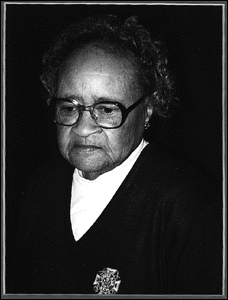 I worked as the children's nurse for a family that owned hotels in Florida, Arizona and Maine...traveled with them...cared for their four children. The maids and cooks had their own cottage but I lived in the main house because I had to be near the children. I had a nice bedroom with a sitting room. At Oqunquit, I would take the children on picnics and to the beach. There were a lot of celebrities around there. Bette Davis would come by-- she liked to play with the children and make sand houses.
I worked as the children's nurse for a family that owned hotels in Florida, Arizona and Maine...traveled with them...cared for their four children. The maids and cooks had their own cottage but I lived in the main house because I had to be near the children. I had a nice bedroom with a sitting room. At Oqunquit, I would take the children on picnics and to the beach. There were a lot of celebrities around there. Bette Davis would come by-- she liked to play with the children and make sand houses.
When I first went to the shipyard, I was a file clerk. And then they were training the women on the cranes...you had to climb all those catwalks...l'm not going to say I wasn't afraid, I was. But I wasn't going to give [the men] the benefit of the doubt of knowing it. They had the wall cranes but they didn't pay as much money as the 20 tons, so that's what I wanted. You...had three months to qualify and...six months to make your first rating. So I kept going up until I got to be a first mate's crane operator on the 20 ton crane. That's the one that lays the keels for the submarines, the cradle, and the engines, torpedo tubes, anything like that. I worked on those 110 feet in the air. So I did that during wartime.
I went to beauty school in Boston and when I finished there I worked at [a] beauty parlor for one year. I opened my own shop and after my husband died I kept working at that and in the house, with my tenants and everything. I had my house cut up into apartments and two rooms over the beauty shop for single guys, but most of them were couples from the air base and navy. At the same time, I was going to night school, Maclntosh Business College, when they had a branch here up on State Street. I took shorthand and typing and I got a certificate from there. I was always taking something.
(c) Valerie Cunningham





